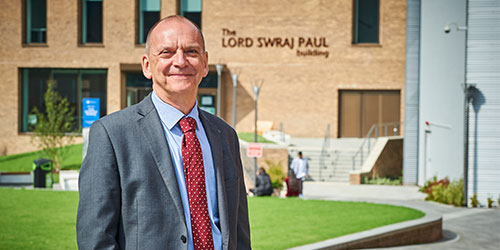Ensuring equity for disabled applicants in a new post-qualification admissions system

A blog post by Vice-Chancellor Professor Geoff Layer, published by Advance HE, about why the needs of disabled students must be taken into account when making the university admissions system fairer.
One of the biggest decisions many people make in life is about deciding to study at university or college. It is one of those decisions that can have a major impact on an individual’s future. The decision can affect careers, family, community engagement and a person’s wellbeing. For many potential students they are also making that decision at a time of heightened stress levels imposed by the school and college testing culture.
In making such a decision the student has to think about what they want to study, what it might lead to in the future, the nature and type of college or university and where they want to study. All of this can be quite daunting, but not as daunting as it is for a disabled student. They need to take account of all of the same issues plus much more. So going through the disabled students mind is also:
Will the course have a learning style that can address my reasonable adjustments?
Will the university have a support service that understands my disability?
Will the accommodation have appropriate facilities?
Will the layout of the university and buildings enable or hinder my mobility?
Does the Students’ Union have a proactive approach to engagement of disabled students?
How does the transition process into HE work for my disability?
What happens if the financial support I need is not in place when my studies start?
For all students thinking about their next steps they need good quality information advice and guidance in order to address all of these issues. Unfortunately that guidance is uneven and patchy, despite many efforts from across the sectors and the development of new approaches. Essentially it is the case that those in the most advantaged parts of society are more likely to have access to that level of informed support. However, it is unlikely to be there for disabled students who can have a mountain to climb in seeing the necessary specific information that they need.
In June 2020 the Disabled Students Commission published a set of recommendations that universities, colleges and the sector needed to address during the pandemic to support disabled students applying to higher education. Universities were asked to report on how they had addressed the recommendation in their Access and Participation Plan monitoring statements and we wait to see that progress.
The DSC put the recommendations together after talking to disabled students and consulting colleagues in the sector. The pandemic may have moved to become an endemic but the issues for disabled students are the same and have not gone away.
That is why it is disappointing that the debate on reforming the admissions system so that it is more student focused has concentrated on the mechanics of the system and not the support of students. The mechanics are clearly important but unless we address the student guidance needs the mechanics of whatever system is adopted will simply continue to give the most vulnerable students a mountain to climb.
That is why the Disabled Students Commission has set out a series of guiding principles that the admissions review established by the Secretary of State needs to address. These principles indicate that the admissions process should be seen as a journey and each stage of the journey needs to have appropriate and tailored guidance.The three stages of the journey are focused onto choosing the course, making the application and communicating specific needs and when the place is fully confirmed place the detailed guidance on transition, orientation and reasonable adjustment.
This means universities have to be much clearer in their information and advice of services and learning support. This needs to be specifically addressed on webpages and with appropriate back up information support. UCAS, the OfS and the sector need to work together to ensure that institutions using whatever system we have are committed to establishing a guidance framework for disabled students that works. The DSC will be producing guidance on the generic IAG needs including what a university should provide as a minimum, continue to work with the Student Loan company over the application process for the Disabled Student Allowance and produce a model of the disabled student journey through the admissions process, identifying key milestones.
We need to make sure that our disabled students have time, information, guidance in order to make the right decision, access the support they need and to have it all in place before they start their studies. We need that in the current system, we need to be even more focused in any changed system. Yes, the mechanics of any new system are important but don’t forget the needs of our most vulnerable. That is why the DSC will be campaigning to ensure the disabled student journey into higher education is considerably better. This means HEP’s, UCAS, SLC, schools and colleges need to enhance their delivery and OfS needs to ensure that change is delivered. Otherwise, the vulnerable stay vulnerable.
Original published on by Advance HE.
For more information please contact the Corporate Communications Team.


/prod01/wlvacuk/media/departments/digital-content-and-communications/images-2024/Diane-Spencer-(Teaser-image).jpg)
/prod01/wlvacuk/media/departments/digital-content-and-communications/images-18-19/220325-Engineers_teach_thumbail.jpg)
/prod01/wlvacuk/media/departments/digital-content-and-communications/images-2024/240509-Menopause-Research-Resized.jpg)
/prod01/wlvacuk/media/departments/digital-content-and-communications/images/Maria-Serria-(teaser-image).jpg)
/prod01/wlvacuk/media/departments/digital-content-and-communications/images-2024/241014-Cyber4ME-Project-Resized.jpg)
/prod01/wlvacuk/media/departments/digital-content-and-communications/images-2024/240315-Research-Resized.jpg)
/prod01/wlvacuk/media/departments/digital-content-and-communications/images-2024/BDA-group-photo.jpg)